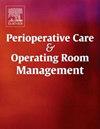An analysis of the economic challenges facing central sterile processing employees in the United States: Results of a national survey
IF 1
Q2 Nursing
Perioperative Care and Operating Room Management
Pub Date : 2025-07-01
DOI:10.1016/j.pcorm.2025.100520
引用次数: 0
Abstract
Objectives
This study aims to examine the economic challenges facing sterile processing department (SPD) workers in the United States and their implications for the healthcare system. We investigated the socioeconomic factors affecting this essential workforce to identify inefficiencies and guide reforms that could improve healthcare sustainability and workforce wellbeing.
Perspective
The analysis was conducted from a societal perspective to consider the broader impact of SPD workforce challenges on healthcare system performance, worker financial health, and institutional sustainability.
Methods
A national cross-sectional survey was distributed via email to over 50,000 individuals affiliated with sterile processing. A total of 1056 responses were received. The survey included 51 questions covering demographic data, employment characteristics, financial health indicators, and job-related benefits. Data were analyzed using R version 4.4.2. Statistical analyses included multiple linear regression and analysis of variance to assess predictors of current wages and associations with demographic and professional variables.
Results
Of the 1056 respondents, 854 were based in the United States and 53 percent were SPD technicians. Most respondents reported stagnant wage progression and inadequate benefits. Unionized, vendor-employed, and contract technicians earned significantly higher wages than non-unionized counterparts. Older and more experienced workers held higher-wage positions. Debt was widespread across all income bands, with many reporting limited savings and a history of financial hardship. Regression analysis revealed that experience, starting salary, and job title were the strongest predictors of current wages. Inflation-adjusted analysis showed starting wages have not kept pace with the cost of living.
Conclusions
SPD workers in the United States face considerable financial stress, with implications for workforce retention and healthcare efficiency. Systemic improvements including wage reform, workload management, and deployment of technology are needed to support this vulnerable sector. Addressing these economic challenges can enhance the long-term sustainability of the healthcare system.
美国中央无菌处理员工面临的经济挑战分析:一项全国性调查的结果
目的本研究旨在研究无菌处理部门(SPD)工人在美国面临的经济挑战及其对医疗保健系统的影响。我们调查了影响这一重要劳动力的社会经济因素,以确定低效率并指导改革,从而提高医疗保健可持续性和劳动力福利。该分析是从社会角度进行的,以考虑SPD劳动力挑战对医疗保健系统绩效、员工财务健康和机构可持续性的更广泛影响。方法通过电子邮件对5万余名从事无菌处理的人员进行全国性横断面调查。共收到1056份答复。该调查包括51个问题,涵盖人口统计数据、就业特征、财务健康指标和与工作相关的福利。数据分析采用R 4.4.2版本。统计分析包括多元线性回归和方差分析,以评估当前工资的预测因素以及与人口统计学和专业变量的关联。在1056名受访者中,854名来自美国,53%是SPD技术人员。大多数受访者表示工资增长停滞不前,福利不足。加入工会的、供应商雇佣的和合同技术人员的工资明显高于没有加入工会的同行。年龄更大、经验更丰富的工人担任工资更高的职位。债务在所有收入阶层中都很普遍,许多人表示储蓄有限,而且有过经济困难的历史。回归分析显示,经验、起薪和职称是当前工资的最强预测因子。经通胀调整后的分析显示,起薪并没有跟上生活成本的增长。结论:美国的spd工作者面临着相当大的财务压力,这对劳动力保留和医疗效率产生了影响。需要进行系统性改进,包括工资改革、工作量管理和技术部署,以支持这一脆弱部门。解决这些经济挑战可以增强医疗保健系统的长期可持续性。
本文章由计算机程序翻译,如有差异,请以英文原文为准。
求助全文
约1分钟内获得全文
求助全文
来源期刊

Perioperative Care and Operating Room Management
Nursing-Medical and Surgical Nursing
CiteScore
1.30
自引率
0.00%
发文量
52
审稿时长
56 days
期刊介绍:
The objective of this new online journal is to serve as a multidisciplinary, peer-reviewed source of information related to the administrative, economic, operational, safety, and quality aspects of the ambulatory and in-patient operating room and interventional procedural processes. The journal will provide high-quality information and research findings on operational and system-based approaches to ensure safe, coordinated, and high-value periprocedural care. With the current focus on value in health care it is essential that there is a venue for researchers to publish articles on quality improvement process initiatives, process flow modeling, information management, efficient design, cost improvement, use of novel technologies, and management.
 求助内容:
求助内容: 应助结果提醒方式:
应助结果提醒方式:


